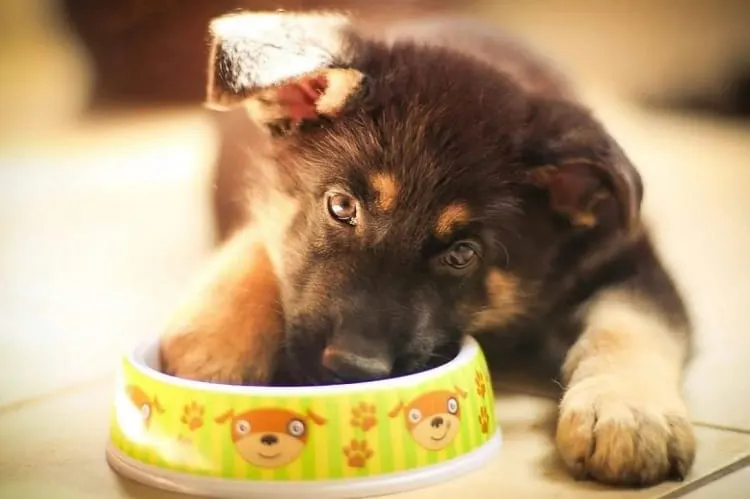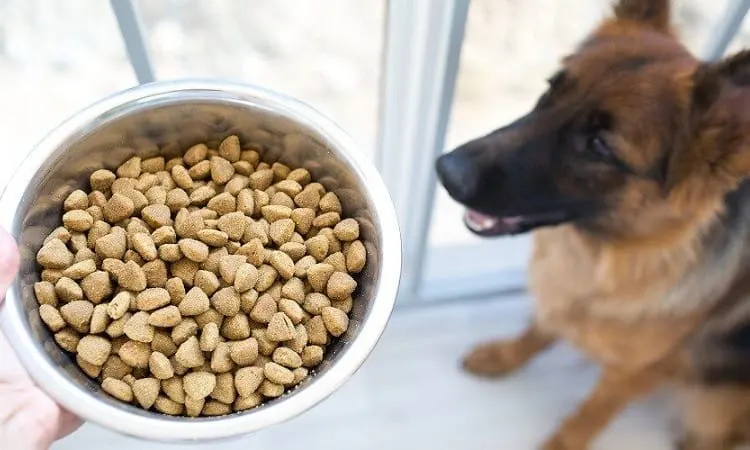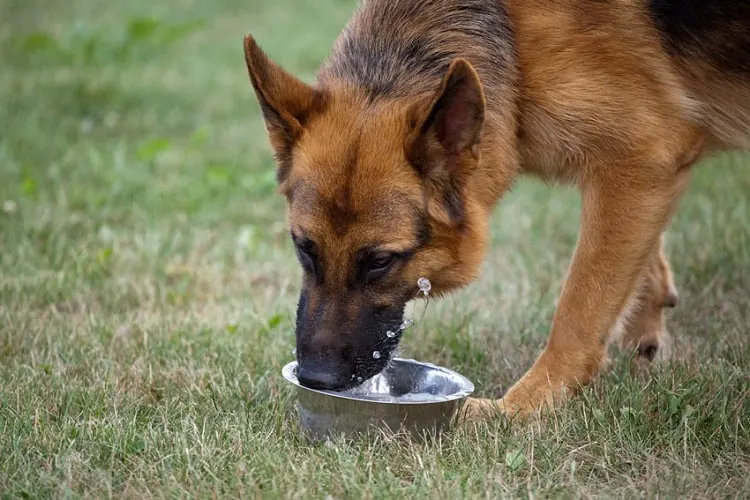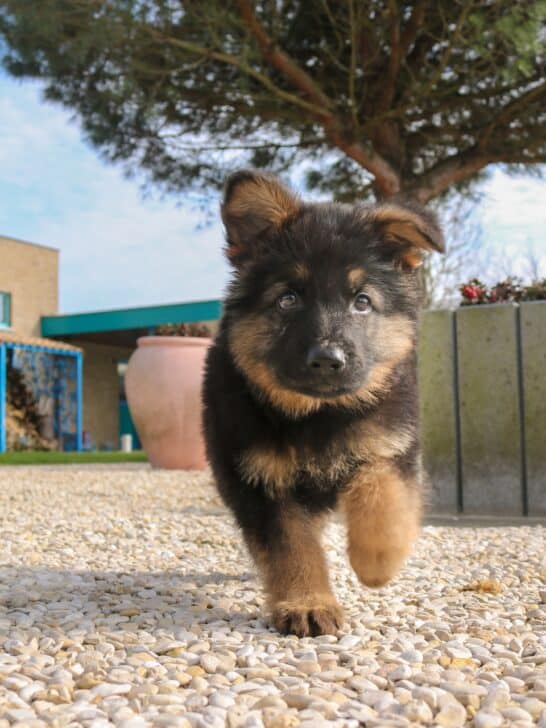When Does Puppy Poop Become Solid?
Any pet owner knows that dealing with their animal’s waste is just part of the job. However, when it comes to puppies, there can be a lot of confusion about what is normal and what isn’t.
Puppies are often fed multiple times a day, and they tend to eat anything and everything, which can often lead to digestive issues and loose stools.
In the following paragraphs, we will talk in detail about how a puppy’s food and diet can directly affect their poop.
Moreover, we will explain what steps to take to solidify it as soon as possible, so you don’t have to deal with the mess.
How Does Food Affect Puppy Poop

A puppy’s diet is the most significant factor to analyze when it comes to loose stools, and as an owner, it’s your responsibility to control what your puppy eats.
If, for instance, your puppy likes to investigate the garbage can in your kitchen, be prepared to clean a messy poop.
If, however, you provide a high-quality diet and control the eating behavior of your puppy from a very early age, you won’t have to worry about it having digestive problems.
Below are two more main reasons puppies might have different kinds of poop.
Mother’s Milk
If your puppy is still nursing from their mom, you must understand that her milk might affect the little one’s poop.
The mother’s milk contains high levels of lactose which helps soften the puppy’s stool, making it easier to pass. The milk is also rich in nutrients, boosting the puppy’s digestive system.
Ultimately, puppies who nurse tend to have healthier bowel movements than those who are not.
Solid Food
Adding solid food to your puppy’s diet will help them get the nutrients they need and ensure they produce healthy poop.
Choose high-quality, meat-based solid food that is not high in fiber. High fiber food can make your puppy’s poop too solid and difficult to pass.
Does Age Impact a Puppy’s Poop

Yes. A dog’s age can have a significant effect on its poop. Younger dogs tend to produce softer stools, while older dogs may have firmer stools.
This is due to several factors, including diet and activity level. For example, puppies eat more frequently than adult dogs, and their stools are typically softer.
On the other hand, senior dogs may not eat as often and may be less active, resulting in firmer stools.
Age can also affect a dog’s poop color. Puppies tend to have lighter-colored stools, while older dogs may have darker stools.
This is generally nothing to worry about and simply reflects changes in diet and activity level over time.
If, however, you notice any sudden changes in your dog’s poop, it’s always best to consult with a veterinarian to rule out any health problems.
What if My Puppy’s Poop is Inconsistent Throughout a Day

It’s not unusual for a puppy’s stool to be inconsistent throughout the day. They may poop several times in one day or skip a day or two. This is normal behavior and nothing to be concerned about.
However, if your puppy is having diarrhea or constipation, this could signify a more serious problem, and you should take them to the vet.
Diarrhea can cause dehydration, which can be dangerous for puppies. Constipation can also be painful and may require medical intervention.
In most cases, soft stool without blood or mucus usually happens if you’ve recently changed the dog’s diet. Give it a day or two, and it’s all going to be back to normal.
Keep in mind that soft stool can also mean that the dog has intestinal parasites, so consult with your veterinarian, just in case.
Lastly, if your puppy’s poop is watery, keep in mind that it’s a symptom of parasitic or viral infection like parvovirus. Call your vet immediately if that’s the case.
When Should I Panic?
Consult your vet if your dog has been suffering from diarrhea for two or more days or did not poop in the last 24 hours. Monitor the consistency and color of your canine’s stool.
Remember that a healthy dog’s poop is slightly firm and brown. If you see other colors, it’s a sign that there is something wrong with their overall health.
How to Solidify Your Puppies’ Poop
Below you will find tips on how to help your puppy produce healthy and solid poops.
The Right Kind of Food

Provide your puppy with food that’s right for their age and breed. Foods that are not suitable can cause diarrhea which is highly unpleasant for both the puppy and the owner.
When you look through the choices available on the market, keep in mind that commercial dog food that’s widely sold in every store might not be the best choice for your puppy.
It’s low in nutrients and tons of other artificial ingredients that will affect the puppy’s poop.
Give your dog foods that are rich in protein. Also, high dietary fiber food can help soothe your dog’s digestive system.
Pureed pumpkin, for example, is a good source of fiber that can help solidify your dog’s poop. Rule of thumb, you can give half a teaspoon of fiber for every 15 pounds of your dog’s weight.
Correct Feeding Frequency
Set up a feeding schedule. Don’t give your dog food too frequently as it will result in overfeeding and excessive stool deposit.
New owners often can’t resist the “puppy eyes” and give treats to their pup more often than needed.
Remember, if a puppy becomes overweight, poop is one of the last things you have to be concerned about.
Removing Dairy from a Puppy’s Diet
Some puppies cannot digest lactose, so if you feed it with cow’s milk and it ends up having diarrhea, simply stop giving it milk. You should be able to see the poop solidifying in a day or two.
Water

Just like us humans, dogs should stay hydrated. Often, diarrhea causes dehydration, so give your puppy plenty of water every time it has an upset stomach.
Another thing to keep in mind is minerals and electrolytes, which are vital to many critical functions in the puppy’s body.
Having runny stools and pooping more often will result in electrolyte imbalance. Consult with your vet on how to help your puppy with restoring the levels of electrolytes in its body.
Deworming
If your puppy has loose stools, that might be a sign of internal parasites, including flatworms, protozoa, roundworms, and hookworms. If that’s the case, then it has to be dewormed.
Internal parasites cause enteritis or damage to the dog’s mucosa of the internal lining.
When a dog has a hookworm infection, you will most likely see blood in its stool, which means the lining of the intestines is already damaged.
Other parasites like Trichuris vulpis, on the other hand, can cause colitis. Consult your veterinarian for the deworming procedure and schedule.
Underlying Health Condition
If your dog has loose stools and it’s not because of worms or food, that might mean that it has an underlying health condition.
Consult your veterinarian on what types of tests your puppy needs to take to reveal any possible infections. Knowing as early as possible will make the treatment quicker and easier.
Foods Can Help Solidify Dog’s Poop
To solidify a puppy’s poop, you can add a bit of fiber to their diet. This can be in the form of pumpkin puree, bran cereal, or even a tiny amount of ground-up flaxseed meal.
Adding just a little bit of extra fiber will help bind things together and make for firmer, less messy stools.
Factors Affecting a Dog’s Bowel Movement

Below you will find a few factors that directly affect your dog’s bowel movement. Keep those in mind if your puppy is experiencing any poop distortions.
- Age: Younger dog’с аге will affect the frequency of pooping. Younger dogs poop five times a day, while older dogs poop three times at the maximum.
- Stress: Feeling nervous or stressed causes your dogs to poop more often because their digestive system reacts to stressors. Due to stress, your dog’s stomach will be upset, leading to a change in their bowel movement.
- Meal size: Of course, it is given that if the dog eats more, it will poop more. The amount of their food and the frequency of feeding affect defecation.
- Fiber Intake: A good amount of dietary fiber helps regulate your dog’s bowel movement, which prevents diarrhea and constipation.
Essential Cs You Should Monitor

A puppy’s stool’s color, consistency, and content can provide valuable clues about everything from diet to digestive issues.
Paying close attention to your dog’s waste can help you to spot potential health issues early on.
Color
The normal color of a dog’s stool is light to dark brown. However, you might discover different color streaks in their poop which can signify various conditions.
The most unhealthy streaks of color in a dog’s poop are yellow, green, white, red, and black.
- Yellow stools are usually a sign of an unhealthy bladder or liver. If our dog’s poop is yellow, call your vet immediately.
- Green poop usually means a puppy has an upset stomach that can cause vomiting. Also, it can mean grass or plant consumption.
- White spots in a stool mean your dog has worms or internal parasites. If this happens, make sure to deworm your dog.
- Red streaks in a dog’s poop are a sign of internal bleeding. If you see this, go to your vet so your dog will be given proper treatment immediately.
- Black color can means that the dog has internal bleeding.
Consistency
Runny stool means that your dog is not processing or digesting food properly, while a hard stool usually means the dog is dehydrated.
Content
Sometimes, you will find foreign content in your dog’s poop like rocks, grass, leaves, worms, and fur.
If you see hair in their poop, the dog is grooming itself, often triggered by skin disease, allergies, and anxiety.
Conclusion
There’s a lot that goes into understanding your dog’s poop.
While scooping it up is a major part of being a pet owner, monitoring your puppy’s stool is just as important as it can give you insight into their overall health.
In this article, we shared how food affects their poop and how to solidify their stool and keep them healthy and happy.
By being vigilant about your dog’s bowel movements, you’ll be able to address any inconsistencies before they become more significant problems.
Resources:




















